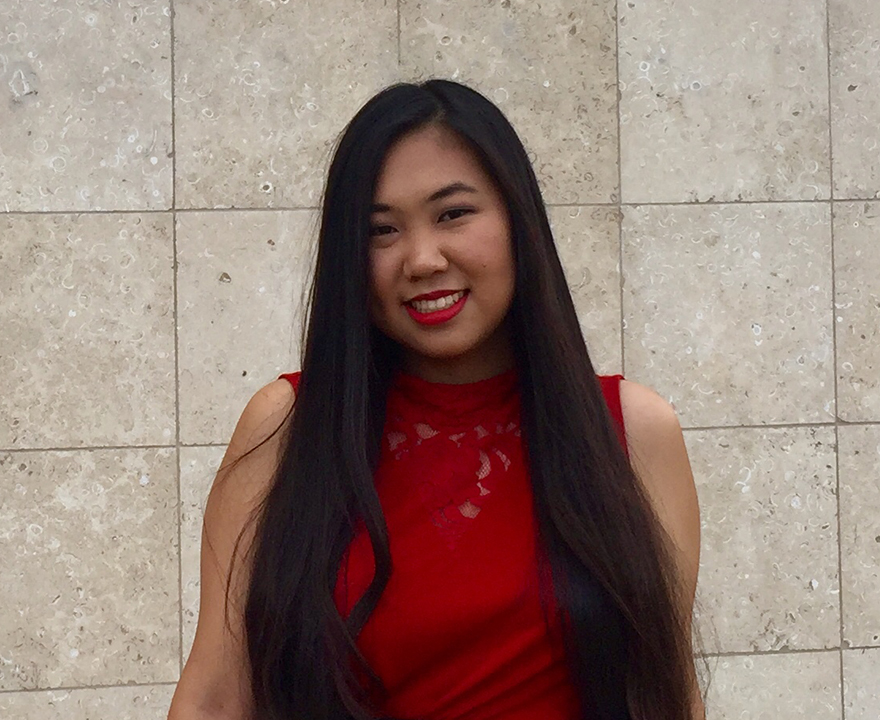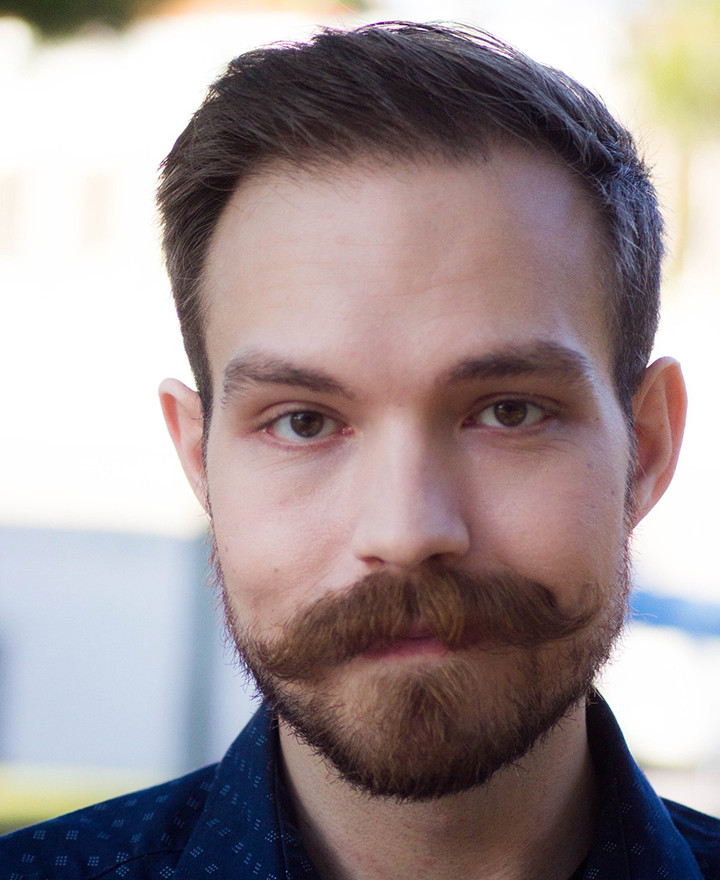
Tips from promising future faculty
 UCI’s Celebration of Teaching Awards honor faculty and graduate students campuswide
for their excellence in undergraduate teaching. This year, two graduate students in
the School of Social Sciences were honored asMost Promising Future Faculty Member. Mary Anne Mendoza (pictured top) completed her Ph.D. in political science this spring
and Alex Bower (pictured right) is a Ph.D. candidate in cognitive sciences. Both are
first generation college students and both participated in UCI's Division of Teaching
Excellence and InnovationPedagogical Fellows program, a selective training program for graduate students.
UCI’s Celebration of Teaching Awards honor faculty and graduate students campuswide
for their excellence in undergraduate teaching. This year, two graduate students in
the School of Social Sciences were honored asMost Promising Future Faculty Member. Mary Anne Mendoza (pictured top) completed her Ph.D. in political science this spring
and Alex Bower (pictured right) is a Ph.D. candidate in cognitive sciences. Both are
first generation college students and both participated in UCI's Division of Teaching
Excellence and InnovationPedagogical Fellows program, a selective training program for graduate students.
In the year-long program, Bower and Mendoza studied different research-based teaching methodologies, culminating with them teaching an intensive, two-day seminar to incoming graduate students to prepare them to serve as TAs.
“UCI has made significant investment in equipping graduate students to be effective teachers,” says Daniel Mann, Director of Graduate Student & Postdoctoral Scholar Instructional Development, who mentored Bower and Mendoza.
“They are both amazing teachers, scholars and academics, but they also are invested in the growth of other people on the same track, in addition to their students,” says Mann, who earned his doctorate in psychology and cognitive neuroscience from UCI’s School of Social Sciences in 2014. “That makes them great colleagues, which is also part of being an academic.”
Bower and Mendoza recently shared their key lessons for aspiring faculty members, and how they are adapting to online teaching and learning in the era of COVID-19.
Plan, but be flexible
Perhaps nothing has required more flexibility in teaching than the coronavirus pandemic and the sudden transition to online instruction. Even without these extraordinary circumstances, both Bower and Mendoza stress the importance of planning their teaching lessons, yet adapting to any given situation.
As a Pedagogical Fellow, Bower volunteered to teach a two-day seminar about teaching assistantships for incoming graduate students in the School of Medicine. On the first day, he learned that the vast majority of them may never TA a class, and Bower had to recalibrate his lessons to emphasize more general skills such as time management, leadership and communication, which would be applicable to their graduate experience.
Making changes on the fly came easily to Bower, who has been an improv teacher and performer for over a decade and trained with The Second City in Hollywood.
“It’s important to have an outcome-focused lesson plan, but any teacher can tell you that things don’t always go according to plan. You must approach each lesson with an open, student-centered mindset. If you trust yourself and your students, and you work together, things will be all right,” he says.
Mendoza agrees that it’s important to be deliberate about planning objectives for each lesson, but flexible about how you achieve those objectives.
“I’ve taught the same intro to comparative politics course every term for the past three years, and the content is similar but the class is always different because it’s a different group of students,” she says. “Some groups engage in a lot of discussion on their own, and others need entirely different prep. You have to be willing to meet the students where they are at.”
Employ empathy
Mendoza points out that teaching does not happen in a vacuum.
“If you’re not in tune to student needs, it doesn’t matter how perfect your lecture is, it’s going to fall flat. Especially now with the switch to remote learning, it’s important to think from the student perspective,” she says.
Bower echoes her sentiments. “You can’t ever forget that education is a human endeavor, and other people have backgrounds that are different from yours,” says Bower. And it’s precisely that mix of backgrounds and perspectives that can make the learning experience so effective.
“I’m a performer by nature, so I see teaching as a live performance,” says Bower. “There’s a unique value in having a teacher and students in the same physical — or, with remote learning, social — space. We learn from each other. It’s this sense of collaboration that sets the classroom apart from books or videos alone.”
The need for empathy and connection with students extends beyond the classroom itself. Bower learned this first hand. His beloved graduate advisor and mentor passed away suddenly of cancer, and Bower had to switch to another research lab in the middle of his studies.
“We need to have empathy. To support and listen to each other. To remember that, at the end of the day, we’re all human,” he says. “It’s critical to connect with and empower others.”
Mentor others
It was meaningful human connections that led Mendoza and Bower to pursue academia.
Mendoza attended a small liberal arts college, University of La Verne, where there were only four faculty members in her major, and she developed strong relationships with them. It was one of those faculty members who challenged her to rethink her plans to go to law school, and then helped her prepare to become a college professor.
“I wouldn’t have applied to grad school if it weren't for my undergraduate professors,” says Mendoza, who still keeps in touch with those faculty. “I always attribute my success to my professors, not because they taught me to remember key dates, but because of their mentorship.”
As a lecturer herself, Mendoza tries to incorporate kindness and mentorship into her classroom and office hours.
“She’s also really dedicated to Filipinx American inclusion and visibility in academia. Proactive in trying to serve as a role model from people with a similar background,” says Mann.“She’s a champion of her cultural background in her work and strives to promote inclusion relative to where she can be a mentor.”
For Bower, a community college professor initially inspired his love of both teaching and psychology. Now, as Bower mentors others, he has come to see it as one of the most rewarding aspects of academia, as he experienced recently when one of his mentees earned a campus scholarship to support her research.
“Sometimes, it’s like I put in everything I have, and I’m left wondering ‘Is it good enough? Have I done enough?’” he says. “Then I see how I’ve helped someone else. How I can make a positive impact on someone else’s life. That keeps me going.”
Balancing teaching and research
Bower and Mendoza of course appreciate the importance of research productivity to their aspirations as tenure-track faculty. While they both agree that time management is critical to balancing teaching loads and their own research, they also suggest that future faculty look for opportunities for their research and teaching to overlap.
Whenever possible, Mendoza says she incorporates her own research on nationalism into her course lectures.
Bower is currently writing a book chapter about how to use a fluid approach to lesson planning. He suggests that any instructor can run small experiments based on their teaching practices and publish their findings, not only contributing to evidence-based pedagogy but also gaining critical publication opportunities.
Practice, practice, practice
Another key element in both Bower and Mendoza’s graduate careers is that they have spent a lot of time teaching. A lot.
Mendoza has been an adjunct faculty for more than 3 years, both at her alma mater the University of La Verne and at Cal Poly Pomona, where she has secured a full-time, tenure track job for fall 2020.
Bower also serves as a lecturer at UCI, and says it’s a dramatically different experience than TAing.
“Every time you walk into a classroom it changes you a little bit as a teacher,” says Bower. “I’ve been TAing and teaching high school improv for years, but the first time I taught my own course at UCI was a transformational experience.”
Mann, who mentored both Mendoza and Bower when they were pedagogical fellows, says they stood out for their willingness to volunteer for additional teaching opportunities. “They were both proactive and both up for opportunities to teach additional workshops for TAs outside of their own departments,” he says.
That amount of practice with their pedagogy puts Mendoza and Bower ahead of the curve.
While teaching in the era of COVID-19 is unlike anything Bower, Mendoza, or most other graduate students prepared for specifically, success now requires even more flexibility, empathy, effortful mentorship and time management.
“Ironically, the pandemic is pushing everyone to think more about their teaching practices,” adds Mann. “But those who had already invested a lot in that space, like Mary Anne and Alex, are much better equipped to confront those challenges now.”
-Christine Byrd for UCI Social Sciences


